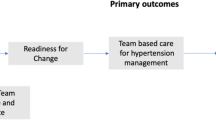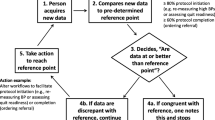Abstract
Panel management, a set of tools and processes for proactively caring for patient populations, has potential to reduce morbidity and improve outcomes between office visits. We examined primary care staff’s self-efficacy in implementing panel management, its correlates, and an intervention’s impact on this self-efficacy. Primary care teams at two Veterans Health Administration (VA) hospitals were assigned to control or intervention conditions. Staff were surveyed at baseline and post-intervention, with a random subset interviewed post-intervention. Panel management self-efficacy was higher among staff participating in the panel management intervention. Self-efficacy was significantly correlated with sufficient training, aspects of team member interaction, and frequency of panel management use. Panel management self-efficacy was modest among primary care staff at two VA hospitals. Team level interventions may improve primary care staff’s confidence in practicing panel management, with this greater confidence related to greater team involvement with, and use of panel management.
Similar content being viewed by others
References
McGlynn E, Asch S, Adams J, et al. The quality of health care delivered to adults in the United States. N Engl J Med. 2003;348:2635-2645.
Kimura J, DaSilva K, Marshall R. Population management, systems-based practice, and planned chronic illness care: integrating disease management competencies into primary care to improve composite diabetes quality measures. Dis Manag. 2008;11:13-22.
Ostbye T, Yarnall KS, Krause KM, Pollak KI, Gradison M, Michener JL. Is there time for management of patients with chronic diseases in primary care? Ann Fam Med. 2005;3(3):209-214.
Module 20. Facilitating Panel Management. May 2013. Agency for Healthcare Research and Quality, Rockville, MD. http://www.ahrq.gov/professionals/prevention-chronic-care/improve/system/pfhandbook/mod20.html
Neuwirth EEB, Schmittdiel JA, Tallman K, Bellows J. Understanding panel management: a comparative study of an emerging approach to population care. Permanente J. 2007;11(3):12-20.
Heisler M, Vijan S, Makki F, Piette J. Diabetes control with reciprocal peer support versus nurse care management. Ann Intern Med. 2010;153:507-515.
Thom D, Ghorob A, Hessler D, De Vore D, Chen E, Bodenheimer T. Impact of peer health coaching on glycemic control in low-income patients with diabetes: a randomized controlled trial. Ann Fam Med. 2013;11(2):137-144.
Long J, Jahnle E, Richardson D, Loewerstein G, Volpp K. Peer mentoring and financial incentives to improve glucose control in African American veterans. Ann Intern Med. 2012;156:416-424.
Rigotti NA, Bitton A, Kelley JK, Hoeppner BB, Levy DE, Mort E. Offering population-based tobacco treatment in a healthcare setting: a randomized controlled trial. Am J Prev Med. 2011;41(5):498-503.
Murray R, Coleman T, Antoniak M, et al. The effect of proactively identifying smokers and offering smoking cessation support in primary care populations: a cluster randomized trial. Addiction. 2008;103(6):998-1006.
Loo T, Davis R, Lipsitz L, et al. Electronic medical record reminders and panel management to improve primary care of elderly patients. Arch Intern Med. 2011;171(17):1552-1558.
Allen J, Dennison-Himmelfarb C, Szanton S, Bone L, Hill M, Levine D. COACH trial: a randomized controlled trial of nurse practitioner/community health worker cardiovascular disease risk reduction in urban community health centers: rationale and design. Comtemp Clin Trials. 2011;32:403-411.
Jandorf L, Gutierrez Y, Lopez J, Christie J, Itzkowitz S. Use of a patient navigator to increase colorectal cancer screening in an urban neighborhood health clinic. J Urban Health. 2005;82(2):216-224.
Vinker S, Nakar S, Rosenberg E, Kitai E. The role of family physicians in increasing annual fecal occult blood test screening coverage: a prospective intervention study. Isr Med Assoc J. 2002;4:424-425.
Myers R, Hyslop T, Sifri R, et al. Tailored navigation in colorectal cancer screening. Med Care. 2008;46(9 Suppl 1):S123-131.
Myers R, Sifri R, Hyslop T, et al. A randomized controlled trial of the impact of targeted and tailored interventions on colorectal cancer screening. Cancer. 2007;110(9):2083-2091.
Lasser K, Murillo J, Medlin E, et al. A multilevel intervention to promote colorectal cancer screening among community health center patients: results of a pilot study. BMC Fam Pract. 2009;10:37.
Walsh J, Salazar R, Nguyen T, et al. Healthy colon, healthy life: a novel colorectal cancer screening intervention. Am J Prev Med. 2010;39(1):1-14.
Aarons G. Measuring provider attitudes toward evidence-based practice: consideration of organizational context and individual differences. Child Adolesc Psychiatr Clin N Am. 2005;14(2):255-268.
Bandura A. Social foundations of thought and action: a social cognitive theory. Englewood: Prentice Hall; 1986.
Manhas C, Bakhshi A. Relating occupational self-efficacy to team effectiveness. Eur J Bus Manag. 2011;3(2):165-172.
Lorig K, Mazonson P, Holman H. Evidence suggesting that health education for self-management in patients with chronic arthritis has sustained health benefits while reducing health care costs. Arthritis Rheum. 2003;36(4):439-446.
Reich S, Bickman L, Heflinger C. Covariates of self-efficacy: caregiver characteristics related to mental health services self-efficacy. J Emot Behav Disord. 2004;12(2):99-108.
Kazanowski M. Family caregivers’ medication management of symptoms in patients with cancer near death. J Hosp Palliat Nurs. 2005;7:174-181.
Larson L, Suzuki L, Gillespie K, Potenza M, Bectal M, Toulouse A. Development and validation of the counseling self-estimate inventory. J Couns Psychol. 1992;39:105-120.
Coleman P, Karraker K. Parenting self-efficacy among mothers of school age children: conceptualization, measurement, and correlates. Fam Relat. 2000;49:5-11.
Strauss S, Astone-Twerell J, Munoz-Plaza C, et al. Correlates of drug treatment program staff’s self-efficacy to support their clients’ hepatitis C virus (HCV) related needs. Am J Drug Alcohol Abuse. 2007;33:245-251.
Tang M, Addison K, LaSure-Bryant D, Norman R, O’Connell W, Stewart-Sicking J. Factors that influence self-efficacy of counseling students: an exploratory study. Couns Educ Superv. 2004;44:70-80.
Tresolini C, Stritter F. An analysis of learning experience contributing to medical students self-efficacy in conducting patient education for health promotion. Teach Learn Med. 1994;6:247-254.
Idel M, Shmuel M, Merlob P, Yahav J, Hendel T, Kaplan B. Influence of a merger on nurses’ emotional well-being: the importance of self-efficacy and emotional reactivity. J Nurse Manag. 2003;11:55-63.
Boyer P. Correlates and determinants of nurse practitioners’ self efficacy in adult obesity treatment and weight management tactics (doctoral thesis). New York: Binghamton University; 2008.
Liao H, Liu D, Loi R. Looking at both sides of the social exchange coin: a social cognitive perspective on the joint effects of relationship quality and differentiation on creativity. Acad Manag J. 2010;53:1090-1109.
Ozer E, Adams S, Gardiner L, Mailloux D, Wibbelsman C, Irwin C. Provider self-efficacy and the screening of adolescents for risky health behaviors. J Adolesc Health. 2004;30(2):101-107.
Wetta-Hall R, Ablah E, Frazier L, Molgaad C. Factors influencing nurses’ smoking cessation assessment and counseling practices. J Addict Nurs. 2005;6:131-135.
Piette J, Holtz B, Beard A, et al. Improving chronic illness care for veterans wihin the framewok of the patient-centered medical home: experiences from the Ann Arbor Patient Care Team Laboratory. Transl Behav Med. 2011;1(4):615-623.
VA Primary Care Program Office. Patient Aligned Care Team (PACT). Accessibility verified February 15, 2013. December 2010:http://www.va.gov/PRIMARYCARE/PACT/index.asp.
Savarimuthu S, Jensen A, Schoenthaler A, et al. Developing a toolkit for panel management: improving hypertension and smoking cessation outcomes in primary care at the VA. BMC Fam Pract. 2013;14:176-184.
Charmaz K. Qualitative interviewing and grounded theory analyses. In: Gubrium J, Holstein L, eds. Handbook of interview research: context and method. Thousad Oaks: Sage; 2002:675-695.
Litaker D, Watts B, Samaan R, Ober S, Lawrence R. Are provider self-efficacy and attitudes related to cardiovascular prevention associated with better treatment outcomes? Transl Res. 2007;149(4):165-172.
Acknowledgments
The authors wish to acknowledge the Program for Research on Outcomes of VA Education research staff for their contributions to this paper. The Program for Research on Outcomes of VA Education study was supported by a grant from the Veterans Health Administration Health Services Research & Development Service (EDU 08–428).
Conflict of interest
Shiela M. Strauss, Ashley E. Jensen, Katelyn Bennett, Nicole Skursky, Scott E. Sherman, and Mark D.Schwartz declare that they have no conflict of interest. The views expressed in this paper are those of the authors and do not necessarily reflect the position or policy of the Department of Veterans Affairs.
Adherence to ethical standards
The VA New York Harbor’s Institutional Review Board and Research and Development Committee approved the study. Informed consent for surveys and interviews was obtained from all participants, with additional consent obtained for audio recording. All study procedures, including the informed consent process, were conducted in accordance with the ethical standards of the responsible VA Institutional Review Board, national policies and the Helsinki Declaration of 1975, as revised in 2000.
Author information
Authors and Affiliations
Corresponding author
Additional information
Implications
Practice: Team-based interventions can enhance clinicians’ confidence in implementing panel management for their patient populations.
Policy: To be successful, structural changes, such as the shift to Patient-Centered Medical Home models and the introduction of electronic health records systems, need to be accompanied by efforts to address barriers and deficiencies in clinician self-efficacy in adopting panel management.
Research: Further investigation is needed to (1) determine the comparative effectiveness of incorporating non-clinician panel managers into primary care teams versus supporting teams to implement strategies themselves, and (2) examine the relationships between clinician panel management self-efficacy, implementation, and patient outcomes.
About this article
Cite this article
Strauss, S.M., Jensen, A.E., Bennett, K. et al. Clinicians’ panel management self-efficacy to support their patients’ smoking cessation and hypertension control needs. Behav. Med. Pract. Policy Res. 5, 68–76 (2015). https://doi.org/10.1007/s13142-014-0287-7
Published:
Issue Date:
DOI: https://doi.org/10.1007/s13142-014-0287-7




